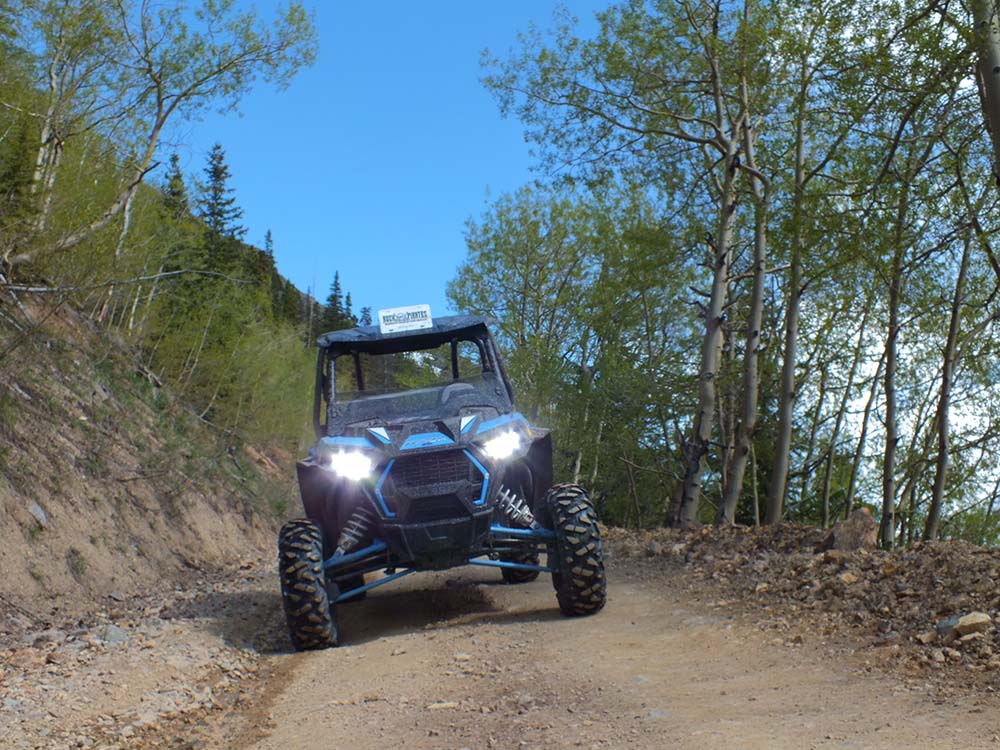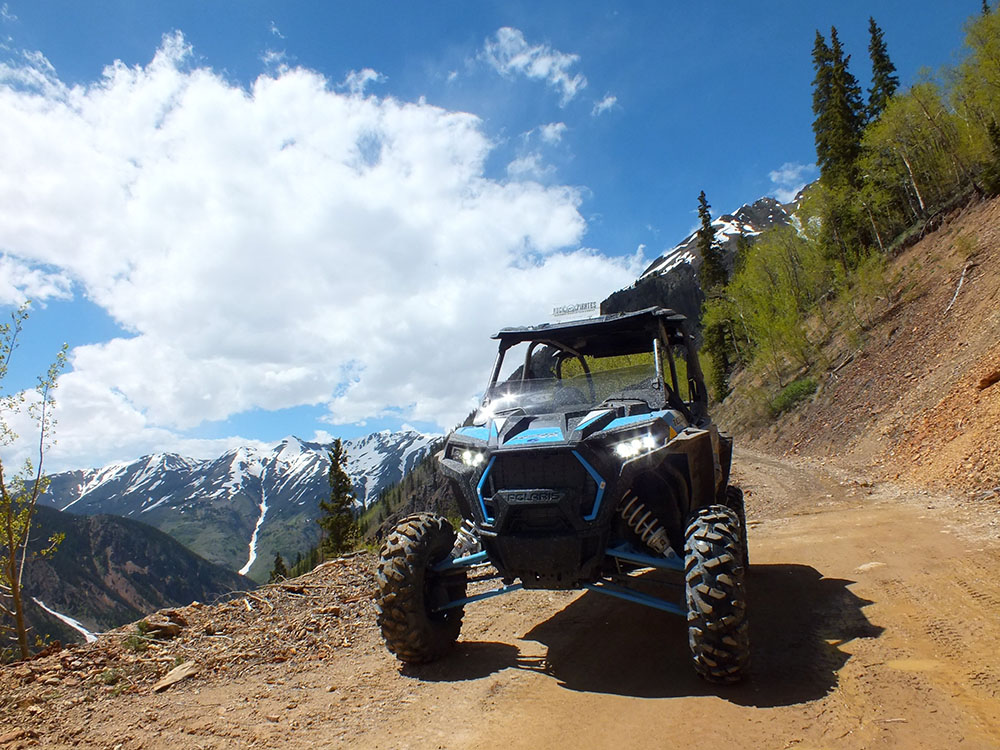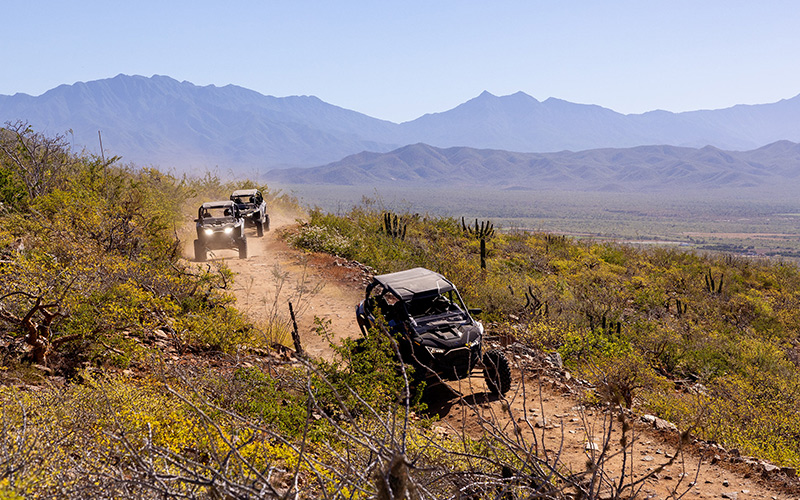Are ATVs dangerous?
This question often lingers in the minds of prospective riders and those considering ATV adventures. All-Terrain Vehicles (ATVs) and Off-Highway Vehicles (OHVs) have surged in popularity for both recreation and utility, offering unmatched agility across diverse terrains.
However, as with any motorized vehicle, understanding and respecting the inherent risks is crucial. This article dives into the world of ATVs, addressing safety concerns, sharing essential tips, and debunking myths to ensure an informed and enjoyable riding experience.

Understanding ATVs
ATVs, or All-Terrain Vehicles, are motorized vehicles designed for a wide range of terrains.
Often seen as a thrilling mix between motorcycles and off-road cars, ATVs combine stability with agility. They come in various models, including utility terrain vehicles (UTVs) and single-rider ATVs, each designed for specific tasks or recreational purposes.
Riding ATVs requires skill and understanding of the vehicle’s capabilities, especially when navigating uneven terrain, high centers, or paved roads.
For both adventure seekers and workers in rugged environments, ATVs offer a powerful and versatile mode of transportation.
But before you go off and hit the trails, having a solid understanding of ATV safety can help you avoid serious injuries and keep yourself and others safe.
Analyzing the Safety Risks
ATV safety is a topic of considerable importance, highlighted by ATV-related accident statistics from sources like the Consumer Product Safety Commission.
While ATVs provide fun and functionality, they also pose risks of injuries and accidents. Common injuries include broken bones, spinal cord injuries, and, in severe cases, head injuries—even with protective gear.
Factors contributing to ATV accidents often include riding at high speeds, lack of appropriate safety gear, and inexperienced riders tackling challenging terrains.
Understanding the risks associated with ATV use is the first step toward promoting a culture of safety among ATV riders.
Important Safety Tips
- Wear Appropriate Safety Gear: Always wear a helmet, goggles, gloves, over-the-ankle boots, long sleeves, and long pants.
- Take a Training Course: Consider completing an ATV safety training course, especially if you’re a beginner.
- Inspect Your ATV: Perform a pre-ride check to ensure your ATV is in good working condition.
- Ride at a Safe Speed: Adjust your speed according to the terrain and your skill level to avoid an ATV accident.
- Stay on Designated Trails: Ride only on trails and areas open to ATVs to avoid unpredictable terrain.
- Avoid Paved Roads: ATVs are designed for off-road use and can be unstable on paved surfaces.
- Never Ride Under the Influence: Alcohol and drugs impair judgment and reaction times and contribute to ATV crashes.
- Ride an Appropriate-Sized ATV: Ensure the ATV fits your size and skill level, especially important for younger riders.
- Keep Both Hands on the Handlebars: Maintain control of your ATV at all times.
- Use a Buddy System: Never ride alone; always have at least one other person with you.
- Respect the Environment: Avoid sensitive areas and stay mindful of wildlife and natural habitats.
- Carry a Communication Device: Have a cell phone or radio for emergencies, especially in remote areas.

Importance of a Proper Training Course
Operating an ATV requires skill and understanding of its unique mechanics. Proper training is vital to safely operate these powerful vehicles, especially for first-time riders.
Training courses often cover essential aspects like handling ATVs on uneven terrain, understanding the vehicle’s high center of gravity, and learning safety rules.
Additionally, training emphasizes the importance of wearing helmets and other protective gear, such as long pants, long sleeves, over-the-ankle boots, and eye protection.
For beginners and even experienced riders, a training course is invaluable, offering insights to enjoy ATV riding safely and responsibly.
If you want a great training course with experienced professionals, Polaris Adventures Outfitters is a great place to receive training from the best in the business.
Additionally – If you are in Southwest Colorado or Baja, Mexico, you can get proper training at Rock Pirates Silverton or Baja Rock Pirates.
Choosing the Right Equipment
Selecting the right ATV is crucial for a safe and enjoyable experience. Most ATVs are designed for specific purposes – from single-rider ATVs ideal for high maneuverability to utility terrain vehicles for heavier tasks.
It’s important to choose an ATV that matches the rider’s skill level and intended use. For instance, a powerful vehicle meant for experienced riders may not be suitable for beginners. Additionally, safety features like speed limiters and seat belts are essential considerations.
An ATV rental and tour company like Pirate Backcountry Adventures will ensure that each vehicle is well-maintained and equipped with necessary safety features, providing riders with reliable and safe equipment.
Essential Safety Gear
Safety gear is non-negotiable when riding ATVs. The most critical piece of equipment is an approved helmet, which significantly reduces the risk of head injuries.
Other protective gear includes goggles for eye protection, gloves to enhance grip and protect hands, and durable clothing to shield against minor injuries.
Long sleeves and pants protect against scratches and abrasions, while over-the-ankle boots provide ankle support and protection. A rental or tour company will provide all the necessary safety gear, ensuring that every rider is adequately equipped before hitting the trails.
Understanding and Respecting the Terrain
Understanding the terrain is crucial for safe ATV riding.
Different landscapes present unique challenges – a narrow wheelbase might navigate dense forests effectively but may struggle on rocky, uneven ground. Riders should be aware of potential hazards like steep inclines, loose rocks, and sudden dips.
Pirate Backcountry Adventures’ guides have extensive knowledge of the local terrain, providing invaluable guidance to riders. They ensure that routes are suitable for the group’s skill level, allowing riders to enjoy the adventure without compromising safety.
ATV Riding for Different Age Groups
ATV riding can be a thrilling activity for all ages, but it’s crucial to consider age-appropriate practices. Children under the age of 16 should ride ATVs that are suitable for their size and skill level. Most ATVs come with age recommendations and size specifications.
For younger riders, models with a lower power output and speed limiter are advisable.
It’s also important for children and teenagers to receive proper training and always be supervised by an adult.
Benefits of a Guided ATV Trip
Opting for a guided ATV trip, especially for beginners or less experienced riders, has several benefits.
Guides are not only familiar with the trails but also trained in safety protocols and emergency response.
They can offer tips on handling ATVs in different terrains and help riders improve their skills. Guided trips also alleviate the stress of navigation, allowing riders to fully immerse themselves in the experience.
Pirate Backcountry Adventures’ guided trips ensure that all participants, regardless of their experience level, enjoy a safe and memorable ATV adventure.
Creating a Culture of Safety
Promoting a culture of safety is paramount in ATV riding. This involves not only adhering to safety guidelines but also encouraging others to do the same.
The ATV community takes pride in educating customers about safe riding practices, from wearing appropriate safety gear to respecting the vehicle’s limits.
Sharing stories of safe and enjoyable ATV experiences can inspire others to prioritize safety.
If you are interested in a rental company or tour, check out the reviews to see what others have to say about the company and experience. Testimonials from satisfied customers who had safe and fun experiences can be powerful in fostering a community that values responsible ATV riding.
Conclusion
In conclusion, while ATVs can pose risks, these can be effectively managed with the right approach to safety.
Proper training, appropriate equipment, adherence to safety rules, and respect for the terrain are key to a safe ATV experience and to avoiding ATV-related accidents.
Pirate Backcountry Adventures is committed to ensuring that every customer has a safe, enjoyable, and unforgettable adventure. By prioritizing safety, ATV riding can be a thrilling and rewarding experience for everyone.

